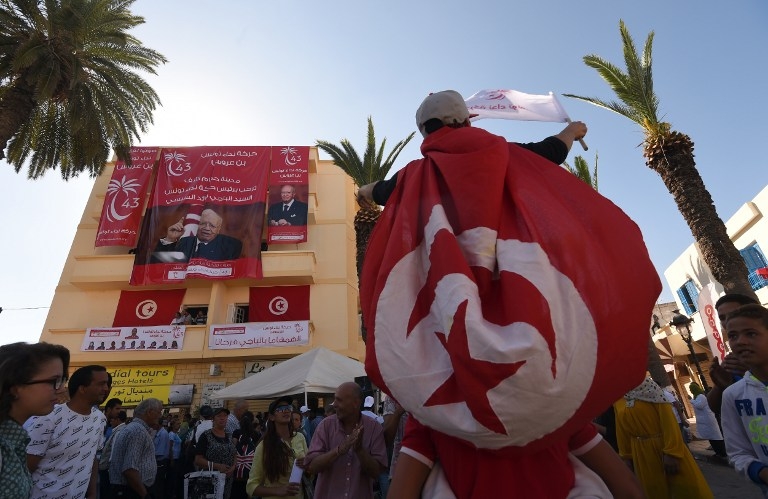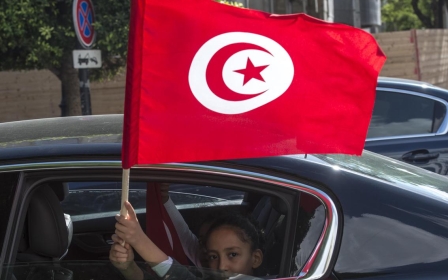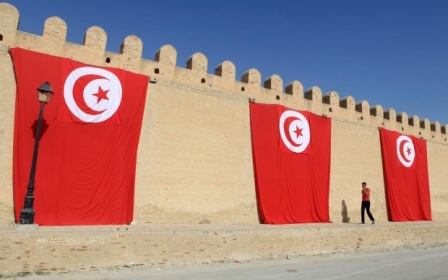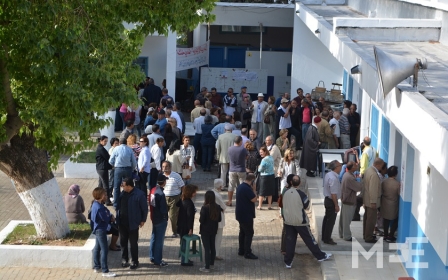What would a Nidaa Tounes-led coalition look like?

TUNIS – With preliminary results indicating a win for Nidaa Tounes and a concession phone call late Monday from Ennahda’s Rashid Ghannouchi to Nidaa’s leader Beji Caid Essebsi, the obvious question is what would a Nidaa Tounes unity government look like?
Final results of the election have yet to be released, but the latest figures show Nidaa Tounes, a secular party formed in 2012, winning the election with 84 seats, or 38 percent of the vote, while Islamist party Ennahda won 69 seats, or roughly 31 percent of the total vote.
Ahead of the elections, Ghannouchi had said Ennahda would be ready to form a coalition government with secular rivals, including former officials under President Zine El Abidine Ben Ali, a point party officials stressed again this week.
“If Nidaa Tounes calls us into a national coalition, we will accept,” said Faisal Nasser, deputy head of communications at Ennahda. If Nidaa tries to build a coalition with other parties, said Nasser, “we will do our duty as an opposition. We will work for democracy.”
But on Tuesday, at least one Nidaa party official implied that Ennahda will not be in its line up.
“If we have to form an alliance, it would be with the democratic parties, the Popular Front, Afek Tounes and Social Democratic Path," Aymen Bejaoui, a senior party member, told reporters.
Some might say Bejaoui's statement creates a false impression, given Ennahda's track record of internal democratic structures is often more transparent than those of its competitors, according to a Brookings report published in February. Nevertheless, it appears clear that Nidaa is leaning away from aligning with Ennahda.
Islamism vs secularism overplayed
Over the past 48 hours, much of the international media, particularly French reports, have interpreted the results as a referendum on Islamism, and a win for secularism in the cradle of the Arab Spring. However, some analysts said this polarisation has not only been sensationalised, but is also inaccurate.
“The Islamism-secular debate is overemphasised,” said Corinna Mullin, a visiting assistant professor in international relations at the University of Tunis. There are a lot of people who voted for Ennahda in 2011 but abstained this time because of the party’s “failure to achieve revolutionary aims,” she said, pointing out domestic and international constraints.
Instead of viewing this development within the Islamist-secular frame, Mullin instead urged analysts to look at the broader picture of disillusionment with the post-revolution process and slow pace of change, in particular amongst the youth. “People wanted to see immediate improvements to their daily lives after the revolution and that didn’t always happen,” she said.
“It’s too early to write Ennahda off,” said Radwan Masmoudi, president of the Washington, DC-based Center for the Study of Islam and Democracy. “It’s still the second largest party. It will play a strong role in the parliament and in the outcome of the presidential elections because their support for a candidate will count for a lot in the bargaining process."
Early signs also suggest a large drop in support for two secular parties, the centre-left Congress for the Republic (CPR) and Ettakatol, an opposition party during the rule of Zine Eddine Ben Ali. Both parties partnered with Ennahda to form a troika government after the 2011 elections. In the face of widespread unrest, however, the troika resigned from government in December 2013 in place of a cabinet of technocrats headed by businessman Mehdi Jomaa.
It’s possible, analysts said, that Nidaa’s apparent plan to exclude Ennahda – as well as CPR and Ettakatol - from a new ruling coalition may have little to do with gaps between the parties’ ideologies and more to do with Nidaa distancing itself from the Troika which has, justly or not, picked up a reputation for economic mismanagement.
In addition to being in charge while economic challenges continued to burden the country, the troika’s period in leadership also saw an increase in religiously-linked violence in Tunisia, another factor that may have pushed voters to Nidaa Tounes, said Anne Wolf, a PhD candidate at Oxford University specialising in Tunisia’s transition.
“We lived under a security state,” said Emir Sfaxi, vice president of civil society group, the Young Independent Democrats. There was “an illusion of safety.” For many, terrorism and security are the most important issues for a future government, he said.
In recent weeks, dominant narratives among some Tunisians and local media have emphasised security and terrorism as a major concern, with social and economic justice – the calling card of the 2011 uprising - often taking a back seat.
This, said Mullin, raises major question marks about the people “who made the revolution possible – the politically and economically marginalised – those people get lost in the conversation of elite politics.”
The smaller parties: kingmakers?
“Building a coalition of such diverse interests [with the smaller parties] will be difficult,” Masmoudi said. “I don’t think Nidaa can form a government without Ennahda.”
The issue is all the more pressing given the heterogeneity of members in Nidaa Tounes itself, many of whom are solely bonded by their opposition to Ennahda.
The party is made up of various currents with “competing objectives”, Wolf said. “Beyond defining themselves as secular and modern, Nidaa Tounes members are ideologically very diverse,” she added.
“There is no ideology in Nidaa,” said Zarghoui. “It’s all about what the leadership says. The party members will follow.”
This implies a danger if the leader of the party, Essebsi, who served under the governments of former presidents Borguiba and Ben Ali, doesn’t win the upcoming presidential elections next month – and will likely raise the significance of the race for other parties as well.
“They need Essebsi to win,” otherwise he will “lose the respect” of the party’s members, Zarghoui said.
Civil society is “afraid” of this scenario, said Sfaxi, in which Nidaa Tounes win both the parliamentary and presidential elections, concentrating power in the hands of few members of the old regime, or tejamaa as it is known locally.
Meanwhile, it looks possible that Ennahda, which has decided not to field a presidential candidate, may look to throw its weight behind Tunisia’s current interim president Moncef Marzouki, leader of the CPR.
Looking to the future
After conflicting reports over voter turnout in recent days, the Independent High Authority for Elections (ISIE) announced on Tuesday that turnout in Sunday’s elections was around 51 percent, about the same as in the 2011 elections.
Numbers aside, some say Sunday’s elections have heralded a psychological benefit for Tunisians. “Tunisians are used to long governments,” said Zarghoui, referring to the 56 years under authoritarian rule by Borguiba, who was succeeded by Ben Ali. “Now they see they can get rid of a government through elections.”
It is a point underlined by Mullin, who told MEE that often lost in the politicking of recent months were the successes of the past three years.
In January 2014, the legislative assembly ratified the constitution, after months of wrangling. Then in May, the government passed an electoral law, a month before it launched the Truth and Dignity Commission to investigate human rights violations committed by the Tunisian state since its independence in 1956.
Meanwhile, a vibrant and growing civil society means that the results of Sunday’s elections are important not just among politicians. Whereas few civil organisations existed before 2011, Sfaxi, the deputy head of a youth organisation, is positive about his role.
“We can’t let the political parties run the country on their own,” he said. “Civil society is their watchdog.”
New MEE newsletter: Jerusalem Dispatch
Sign up to get the latest insights and analysis on Israel-Palestine, alongside Turkey Unpacked and other MEE newsletters
Middle East Eye delivers independent and unrivalled coverage and analysis of the Middle East, North Africa and beyond. To learn more about republishing this content and the associated fees, please fill out this form. More about MEE can be found here.




